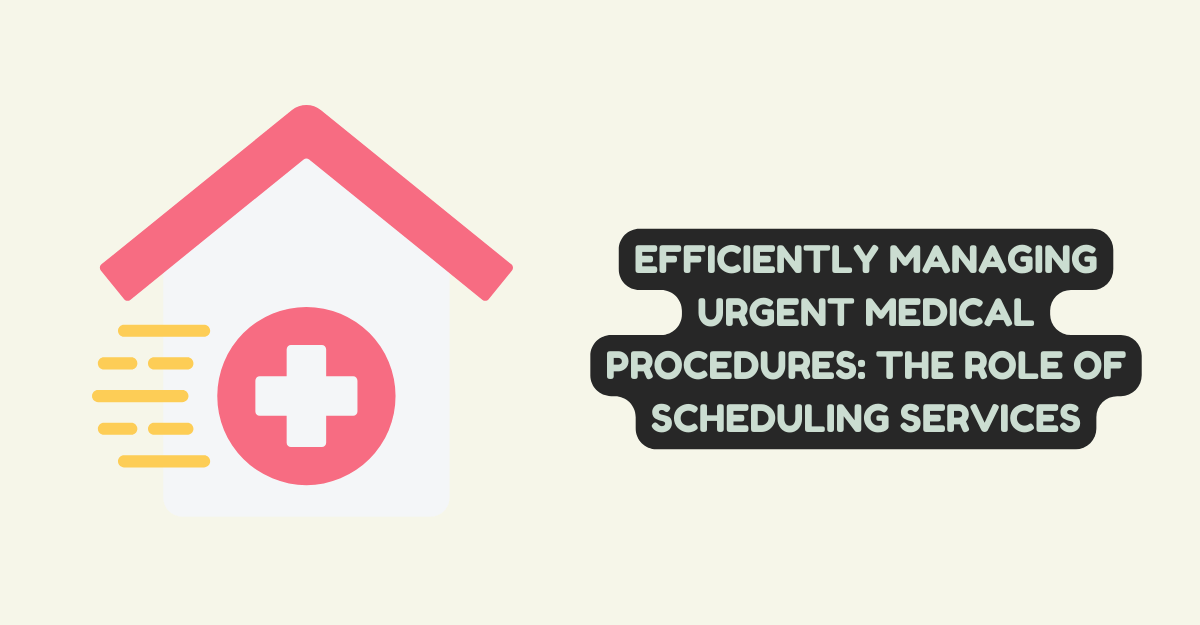
Efficiently Managing Urgent Medical Procedures: The Role of Scheduling Services
Scheduling services dedicated to managing urgent medical procedures play a vital role in ensuring that patients receive timely treatment, reducing wait times, and improving overall patient outcomes. This article explores the importance of scheduling services for urgent medical procedures, the benefits they offer to patients and healthcare providers, and the key features of effective scheduling platforms.
When faced with the need for urgent medical procedures, timing is crucial. EasyMed understands the importance of scheduling services efficiently to ensure patients receive prompt and high-quality care. By streamlining the booking process, EasyMed eliminates unnecessary delays and prioritizes patients in critical need.
With EasyMed’s innovative scheduling system, patients can rest assured that their urgent medical procedures will be arranged promptly and seamlessly. This not only reduces anxiety and uncertainty for patients but also allows healthcare providers to allocate resources more effectively. The convenience and efficiency of EasyMed’s scheduling services help improve patient outcomes and enhance overall satisfaction with the healthcare experience.
Importance of Scheduling Services for Urgent Medical Procedures:
1. Timely Access to Care:
Scheduling services for urgent medical procedures prioritize timely access to care for patients with acute or emergent conditions. By streamlining the scheduling process and coordinating appointments with healthcare providers and facilities, these services ensure that patients receive prompt treatment, reducing the risk of complications and improving outcomes.
2. Optimized Resource Allocation:
Effective scheduling services help healthcare facilities optimize resource allocation by efficiently managing appointment slots, operating room availability, and medical staff schedules. By matching patient needs with available resources in real-time, these services minimize idle time and maximize the utilization of healthcare resources, leading to improved efficiency and cost-effectiveness.
3. Enhanced Patient Experience:
Scheduling services contribute to an enhanced patient experience by providing seamless and convenient access to medical care. Patients benefit from simplified appointment booking processes, reduced wait times, and clear communication regarding appointment details and expectations. A positive patient experience not only improves patient satisfaction but also strengthens patient-provider relationships and encourages patient loyalty.
Benefits of Scheduling Services for Patients and Healthcare Providers:
1. Reduced Wait Times:
One of the primary benefits of scheduling services for urgent medical procedures is the reduction of wait times for patients. By efficiently managing appointment schedules and prioritizing urgent cases, these services help patients access care when they need it most, minimizing delays and ensuring timely treatment.
2. Improved Patient Outcomes:
Timely access to medical procedures facilitated by scheduling services can lead to improved patient outcomes. Prompt treatment of acute conditions reduces the risk of complications and allows patients to recover more quickly, leading to better overall health and well-being.
3. Enhanced Operational Efficiency:
Scheduling services enhance operational efficiency for healthcare providers by automating administrative tasks and optimizing resource allocation. By streamlining the scheduling process, these services reduce administrative burdens on staff, minimize scheduling conflicts, and improve workflow management, allowing healthcare providers to focus more time and attention on patient care.
Key Features of Effective Scheduling Platforms:
1. Real-Time Appointment Scheduling:
Effective scheduling platforms enable real-time appointment scheduling, allowing patients to book urgent medical procedures online or through mobile applications. Real-time scheduling ensures that appointment slots are filled promptly and that patients can access care when they need it.
2. Automated Prioritization of Urgent Cases:
Scheduling platforms automatically prioritize urgent cases based on clinical criteria, ensuring that patients with acute conditions receive timely attention and appropriate care. Automated prioritization algorithms consider factors such as medical urgency, severity of condition, and available resources to optimize scheduling and resource allocation.
3. Integration with Electronic Health Records (EHR) Systems:
Integration with electronic health records (EHR) systems enables seamless communication and data exchange between scheduling platforms and healthcare providers’ electronic medical records. This integration ensures that appointment details, patient information, and clinical notes are easily accessible to healthcare providers, facilitating continuity of care and informed decision-making.
Conclusion:
Scheduling services dedicated to managing urgent medical procedures play a crucial role in ensuring timely access to care, optimizing resource allocation, and enhancing the patient experience. By streamlining the scheduling process, reducing wait times, and improving operational efficiency, these services contribute to improved patient outcomes and overall healthcare quality. Effective scheduling platforms leverage real-time scheduling, automated prioritization algorithms, and integration with electronic health records to provide seamless and efficient scheduling solutions for patients and healthcare providers alike. As the demand for timely access to medical care continues to grow, investing in robust scheduling services remains essential for delivering high-quality, patient-centered healthcare.






